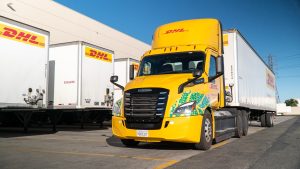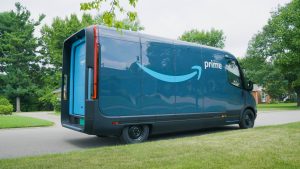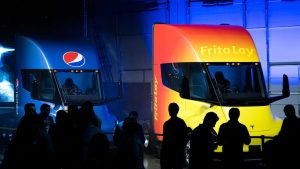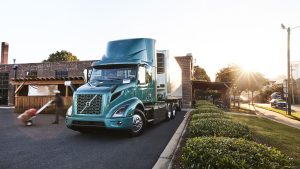- Discover How Major Fleets Are Overcoming the High Costs of Alternative Fuels: Explore real-world strategies that companies are using to mitigate the initial financial challenges of transitioning to sustainable fuel sources.
- Insights Into Innovative Fueling Infrastructure Developments: Learn how shared investments and government incentives are shaping the future of fleet operations.
- Case Studies on the Impact of Fleet Alternative Fuels: Get an inside look at how diverse energy solutions are transforming the transportation industry, driving operational efficiencies, and cutting emissions.
Fleet Alternative Fuels: 5 Comprehensive Case Studies

Alternative fuels are rewriting the rules of the road, setting new standards for the trucking industry’s future.
As the transportation industry moves towards sustainability, fleet alternative fuels are becoming a focal point for companies aiming to reduce emissions and operational costs. This article presents five comprehensive case studies of companies that have transitioned to alternative fuel trucks, discussing their experiences, challenges, cost implications, and the impact on operations.
Discover more about the evolution of alternative fuels in trucking learn more here.
5 Real-World Fleet Alternative Fuels Case Studies
Case Study 1: How Did UPS Transition to Natural Gas Vehicles?
United Parcel Service (UPS) has been a pioneer in adopting fleet alternative fuels. By 2023, UPS invested heavily in natural gas vehicles (NGVs), adding over 1,000 NGVs to its fleet. The company’s fleet fuel transition was driven by goals to reduce emissions and dependence on diesel fuel.

UPS’s shift to natural gas vehicles underscores the practical challenges and strategic investments needed to reduce carbon footprints.
For comprehensive coverage on natural gas vehicles (NGVs) and their impact in the trucking industry, you can read more here
Enjoying our insights?
Subscribe to our newsletter to keep up with the latest industry trends and developments.
Stay InformedChallenges Faced:
- Infrastructure Limitations: Lack of natural gas fueling stations.
- Higher Upfront Costs: NGVs are more expensive than traditional diesel trucks.
Solutions Implemented:
- Building Infrastructure: UPS invested in its own natural gas fueling stations.
- Leveraging Incentives: Utilized government grants and tax credits to offset costs.
Impact on Operations:
- Operational Efficiency: Maintained delivery schedules with minimal disruptions.
- Cost Savings: Reduced fuel costs over time due to lower natural gas prices.
Case Study 2: How Is FedEx Adopting Electric Trucks?
FedEx has focused on electrifying its fleet as part of its commitment to sustainability. By 2023, FedEx integrated hundreds of electric trucks into its operations, primarily for last-mile deliveries. The company collaborated with manufacturers to source vehicles that meet its specific needs.

FedEx electrifies its fleet, pushing the envelope on what’s possible for last-mile delivery sustainability.
Explore the strategies behind fleet electrification explore this page.
Challenges Faced:
- Limited Range: Electric trucks have shorter ranges compared to diesel trucks.
- Charging Infrastructure: Necessity to install charging stations at multiple facilities.
Solutions Implemented:
- Route Optimization: Adjusted delivery routes to align with vehicle range capabilities.
- Infrastructure Investment: Installed charging stations across key locations.
Impact on Operations:
- Environmental Benefits: Significant reduction in carbon emissions.
- Maintenance Savings: Lower maintenance costs due to fewer moving parts in electric vehicles.
Case Study 3: What Steps Did DHL Take Towards Alternative Fuels?

DHL’s diverse approach to alternative fuels highlights the importance of flexibility and innovation in fleet management.
DHL has experimented with various alternative fuel trucks, including electric and hydrogen-powered vehicles. The company’s fleet fuel transition includes a mix of technologies to suit different operational needs.
The role of hydrogen in transforming trucking follow this link.
Challenges Faced:
- Technological Uncertainty: Emerging technologies with limited track records.
- High Initial Costs: Advanced vehicles require significant investment.
Solutions Implemented:
- Pilot Programs: Tested different vehicle types in specific markets.
- Partnerships: Collaborated with tech companies to stay at the forefront of innovation.
Impact on Operations:
- Flexibility: Ability to adapt quickly to the most effective technologies.
- Brand Image: Enhanced reputation as a sustainability leader.
Case Study 4: How Did Amazon Incorporate Electric Vans into Its Fleet?

Amazon’s rapid deployment of electric vans illustrates the scalability of sustainable initiatives within global logistics.
Amazon has been rapidly expanding its use of electric delivery vans. Partnering with manufacturers like Rivian, Amazon aims to have 100,000 electric vans on the road by 2030.
Explore the latest developments in electric truck technology click here for more information.
Challenges Faced:
- Production Delays: Scaling up production of new vehicle models.
- Driver Training: Educating drivers on new vehicle operations.
Solutions Implemented:
- Investment in Manufacturers: Financially supporting vehicle production.
- Comprehensive Training Programs: Ensuring smooth transition for drivers.
Impact on Operations:
- Customer Satisfaction: Improved delivery experiences with quieter, cleaner vehicles.
- Data Collection: Gathering operational data to optimize future deployments.
Case Study 5: How Is PepsiCo Utilizing Compressed Natural Gas Trucks?

PepsiCo’s adoption of CNG trucks demonstrates a commitment to both economic and environmental efficiencies in logistics.
PepsiCo has incorporated compressed natural gas (CNG) trucks into its fleet to reduce emissions and fuel costs.
Understand how emissions are being reduced in modern fleets learn more here.
Challenges Faced:
- Fuel Availability: Limited access to CNG refueling stations.
- Vehicle Performance: Ensuring CNG trucks meet delivery demands.
Solutions Implemented:
- On-site Fueling Stations: Built CNG stations at major distribution centers.
- Fleet Management: Integrated CNG trucks where they are most effective.
Impact on Operations:
- Cost Efficiency: Lower fuel costs over the long term.
- Sustainability Goals: Progress towards reducing the company’s carbon footprint.
Understanding the Impact of Fleet Alternative Fuels Transition

The shift to alternative fuels is not just a trend; it’s a transformative movement across global fleets.
Transitioning to fleet alternative fuels has significant implications for companies. It affects operational efficiency, costs, and environmental impact. The case studies illustrate both the potential benefits and the challenges involved in a company fleet fuel change.
Strategies for enhancing operational efficiency in fleets explore this link.
What Challenges Are Faced in Fleet Alternative Fuels Transition?
Companies often encounter several hurdles during their fleet fuel transition:
- Infrastructure Limitations: Insufficient fueling or charging stations can hinder operations.
- Higher Upfront Costs: Alternative fuel vehicles require a larger initial investment.
- Technological Limitations: Issues like limited range or payload capacity.
- Regulatory Compliance: Navigating varying regulations across regions.
Navigating the regulatory landscape in trucking click here.
What Are the Cost Implications of Alternative Fuel Fleets?
While initial costs are higher, long-term benefits include:
- Lower Fuel Costs: Fuels like natural gas and electricity can be cheaper than diesel.
- Maintenance Savings: Electric vehicles have fewer mechanical parts, reducing maintenance expenses.
- Incentives and Grants: Government programs can alleviate some financial burdens.
How Do Fleet Alternative Fuels Affect Operations?

Adopting alternative fuels requires bold decisions and strategic thinking to drive the trucking industry forward.
Implementing fleet alternative fuels impacts operations in several ways:
- Operational Adjustments: Modifying routes and schedules to accommodate new fueling needs.
- Driver Training: Ensuring drivers are proficient with new technologies.
- Maintenance Changes: Adapting to different maintenance requirements.
What Is the Future of Fleet Alternative Fuels?
The future holds promise due to:
- Technological Advancements: Innovations in battery life and fuel efficiency.
- Policy Support: Increased governmental support for sustainable practices.
- Industry Collaboration: Partnerships leading to better infrastructure and vehicle options.
How sustainability is reshaping the trucking industry check out this link

In the race for efficiency, alternative fuels are leading the charge, redefining how fleets operate on a global scale.
By examining these alternative fuel case studies, it’s evident that while challenges exist, the move towards fleet alternative fuels offers significant benefits. Companies must weigh the alternative fuel cost implications against long-term gains in efficiency and sustainability.
Expanding the Scope of Fleet Alternative Fuels
As these case studies illustrate, transitioning to fleet alternative fuels involves a comprehensive approach encompassing technology adoption, infrastructure development, and strategic operational adjustments. While challenges like high initial costs and infrastructure demands pose significant hurdles, the long-term benefits of reduced emissions and cost savings are compelling.
These initiatives are further supported by government incentives and regulations that help mitigate the initial financial burden and encourage widespread adoption. As technology advances and more companies share their experiences and resources, the path to a sustainable fleet becomes increasingly viable.
By examining these detailed alternative fuel case studies, we gain a nuanced understanding of the diverse strategies companies can employ and the potential challenges and benefits of transitioning to sustainable fleet operations.
To learn about the latest trends and developments concerning transport fleets, follow this link.
Looking Ahead: Navigating the Future of Fleet Transition to Alternative Fuels

The adoption of alternative fuels is more than an environmental gesture; it’s a competitive edge in the logistics market.
As we conclude our exploration of the case studies detailing the transition to alternative fuels, it’s essential to look forward to the emerging trends and innovations that are poised to influence the trucking industry in 2024 and beyond.
Technological Integration and Infrastructure Development: The ongoing integration of advanced technologies such as AI, IoT, and telematics is streamlining fleet operations, enhancing route optimization, and fuel efficiency. Coupled with substantial investments in charging and refueling infrastructure, these advancements support the scalability of alternative fuels, ensuring fleets are equipped for broader adoption.
Sustainability as a Strategic Imperative: More than ever, sustainability is being viewed not just as a regulatory compliance issue but as a strategic component of business operations. Trucking companies are leveraging green technologies to lower operational costs, enhance their market competitiveness, and attract environmentally conscious partners and customers.
Adaptive Workforce Strategies: Addressing workforce challenges, particularly the driver shortage, remains crucial. Companies are enhancing driver recruitment and retention by improving job conditions and offering competitive benefits. This proactive approach is vital for maintaining operational efficiency and compliance with safety and environmental regulations.
Regulatory and Market Dynamics: Navigating the evolving regulatory landscape and market dynamics is crucial for future planning. As we move forward, trucking companies must remain agile, adapting to new regulations and market conditions that affect the adoption and implementation of alternative fuels.
Conclusion: The transition to alternative fuels is a dynamic and multifaceted journey. By staying informed about technological advancements and market trends, and by continuing to innovate and adapt, the trucking industry can successfully navigate the challenges and opportunities that lie ahead. This ongoing evolution will not only enhance the sustainability of fleet operations but also propel the industry towards a more economically viable and environmentally responsible future.
Explore insights and updates on commercial vehicles within the trucking sector at this page.
Dive Deeper into Alternative Fuel Innovations
- Exploring the Shift to Alternative Fuels: Uncover detailed articles on the ongoing transition across different sectors of the transportation industry to more sustainable fuel sources. Explore more about the shift to alternative fuels.
- Latest Advances in Alternative Fuel Technology: Stay updated with the latest technological breakthroughs and innovations that are shaping the future of alternative fuels in transportation. Read about the latest advances in alternative fuel technology.
- Case Studies on Alternative Fuel Adoption: Discover real-world applications and the impact of alternative fuels through comprehensive case studies from leading companies. Delve into case studies on alternative fuel adoption.
- Regulatory Changes Affecting Alternative Fuels: Get informed about the latest regulatory changes and how they are influencing the adoption and development of alternative fuels. Learn about regulatory changes affecting alternative fuels.
- Industry Expert Opinions on Alternative Fuels: Read expert analyses and opinions on the challenges and opportunities presented by alternative fuels in the transportation sector. View expert opinions on alternative fuels.
External Resources for Further Exploration
UPS’s Transition to Natural Gas Vehicles:
- Understanding UPS’s Shift to NGVs: Gain insights into UPS’s strategic adoption of natural gas vehicles and its impact on sustainability and logistics. Read more on NGV adoption at UPS
FedEx and Electric Trucks:
- FedEx’s Electric Fleet Expansion: Explore FedEx’s journey towards electrifying its delivery fleet, including challenges and milestones. Discover FedEx’s electric truck initiative
DHL’s Alternative Fuel Exploration:
- DHL’s Diverse Fuel Strategy: Delve into DHL’s approach to integrating multiple alternative fuels into its operations to boost efficiency and reduce emissions. Learn more about DHL’s alternative fuel strategies
Amazon’s Electric Vans:
- Amazon’s Electric Delivery Network: Understand how Amazon is scaling its use of electric vans to meet its ambitious sustainability goals. Explore Amazon’s electric van rollout
PepsiCo’s Use of Compressed Natural Gas Trucks:
- PepsiCo’s CNG Fleet Innovations: Examine PepsiCo’s extensive use of compressed natural gas in its fleet operations and the environmental and operational benefits derived. Read about PepsiCo’s CNG truck strategy





















